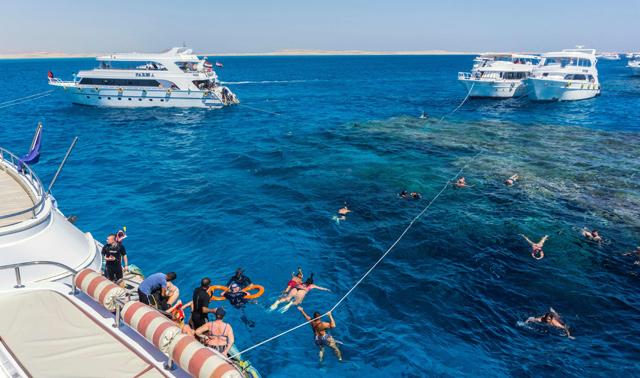You are here
Egypt tourism dealt body blow by Russia airliner bomb fears
By AFP - Nov 05,2015 - Last updated at Nov 05,2015
CAIRO — Concerns raised by Britain and the United States that a bomb may have downed a Russian airliner in Egypt have cast a shadow over a once popular holiday destination already hit by years of political turmoil.
The Egyptian affiliate of the Daesh terror group has claimed responsibility for the crash, and on Wednesday the United States and Britain said the mid-air disintegration of the Airbus A321 over the restive Sinai Peninsula — a Daesh bastion — could have been caused by a bomb.
A string of major tour operators immediately suspended all packages to the beach resorts of the peninsula's south coast, and analysts warned of a serious risk of lasting damage to a key sector of the Egyptian economy.
"This really could represent a hard blow to the Egyptian tourism industry already burdened by years of political uncertainty," said Fawaz Gerges, professor at the London School of Economics.
"Would you go to Sharm El Sheikh is the question now?"
On Wednesday, Britain and Ireland suspended flights to and from the South Sinai resort airport of Sharm El Sheikh, from where the Saint Petersburg-bound airliner took off on Saturday before crashing 23 minutes later, killing all 224 people on board.
Egypt has long promoted the Red Sea resorts of Sharm El Sheikh and Hurgada as jewels of its tourism industry.
Famed for their pristine beaches and scuba diving, they have attracted millions of holidaymakers, many of them Russians.
Saturday's plane disaster was the latest in a series of blows to international confidence in tourist safety this year.
In September, eight Mexican tourists were mistakenly killed by Egyptian security forces in the vast Western Desert.
In August, Egypt's Daesh affiliate claimed the beheading of a Croatian expatriate worker abducted outside Cairo.
The two incidents came just months after police foiled an attempted suicide bomb attack near the famed Karnak temple in Luxor — one of Egypt's most popular heritage attractions.
Tour operators say the latest disaster is the biggest blow so far.
"Tourism in Egypt will simply die if it was a terrorist attack that brought the plane down," said Hamada Nagi, a tour operator from Hurgada.
Long-term impact
Daesh has so far not provided any details in its claim, but aviation experts say the fact that debris and bodies were strewn over a wide area points to a mid-air disintegration of the aircraft.
"The damage is already done. Even if it was pilot error or accident, people believe it was a bomb," Jacques Peter, manager at the Savoy Group of luxury hotels in Sharm el-Sheikh, told AFP.
"There are no cancellations at the moment, but we are concerned for the medium and long term — the reservations curve, which usually begins to rise ahead of Christmas and New Year, is flat and that's unusual."
Tourism used to account for about 12 per cent of Egypt's gross domestic product and some 15 per cent of its foreign exchange earnings.
But the industry has faltered since early 2011, when a popular uprising toppled longtime strongman Hosni Mubarak after three decades in power.
Years of instability and a rising tide of attacks claimed by jihadists have kept many would-be visitors away, damaging the economy and sending Egypt's foreign currency reserves plunging.
Last year, just under 10 million tourists visited, sharply down on the 15 million who came in 2010, state media reported.
On Saturday, tour operators in Russia reported a sales drop of 30 to 50 per cent in a "shock reaction" to the crash, Russia's Interfax news agency reported, quoting a tourism official.
"There have been cancellations in the first few days, but there aren't many of them," Yury Barzykin, vice president of the Russian Tour Industry Union, told AFP.
But "if the version about a terrorist attack is confirmed, that will raise more concern."
Every fifth Russian tourist going abroad goes to Egypt, he said, adding that even the political turmoil and unrest that followed the July 2013 ouster of Islamist president Mohamed Morsi failed to prompt a serious drop.
Sharm El Sheikh was hit by bombings in July 2005 that killed nearly 90 people, in one of the deadliest attacks in Egypt.
For many, Saturday's disaster was a reminder of such attacks.
Russian tourists in Hurgada were "still shocked and worried" after the crash, said tour operator Nagi, although some said that heightened security measures can cushion any long-term blow.
"If security measures are taken and widely announced, then there won't be a critical drop," said Barzykin.
"Egypt is the main destination for Russians, it has no competitors in the winter period, due to its climate, the standard of service and prices."
Related Articles
CAIRO — Despite a lack of evidence for the claim, the Daesh terror group has stepped into the spotlight by saying it downed a Russian airlin
CAIRO — Egypt said Monday it still has no evidence to back up Moscow's analysis that a "terrorist" attack had downed a Russian passenger pla
Nahas, 42, has spent half of his life in the idyllic, sun-drenched Red Sea resort which was badly hit economically after the 2015 downing of a Metrojet plane that killed 224 mostly Russian passengers.














